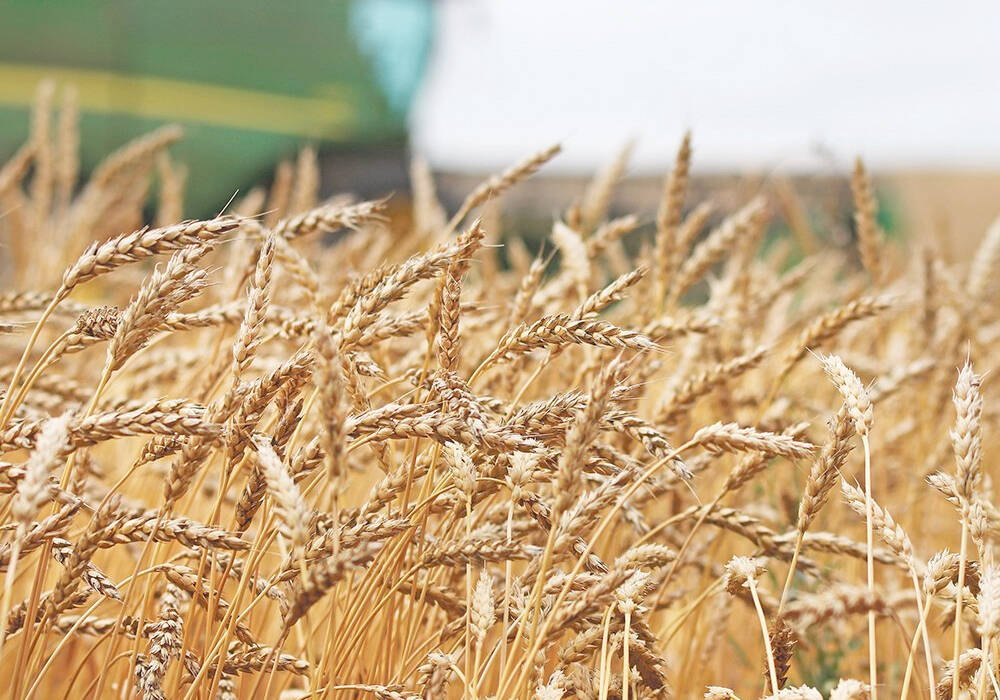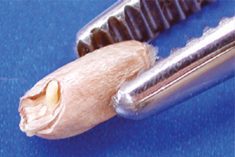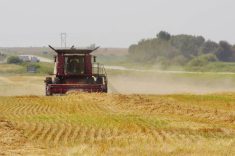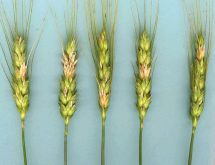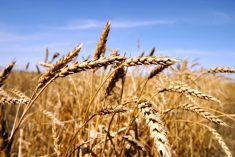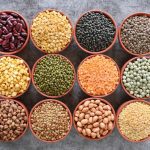* More soy cancellations expected
* New-crop corn and soy underpinned by wet weather
* Wheat firm on short-covering, U.S. weather worries
(Updates with closing princes; adds quotes)
By Sam Nelson and Julie Ingwersen
CHICAGO, May 29 (Reuters) - Chicago Board of Trade (CBOT)
soybean futures fell on Wednesday following news that China, the
world's largest buyer of soybeans, had cancelled an order for
U.S. soy.
Corn was mixed, with old-crop falling on profit-taking. But
new-crop December rose for the fifth day in a row, hitting a
one-month high as wet weather hampered U.S. corn plantings,
Read Also

Wheat prices likely headed for sideways trade
U.S. brush with a severe winter storm put only brief upward pressure on wheat futures markets into last week of January.
threatening yield and production prospects.
Wheat rose on short-covering and mounting concern that
portions of the U.S. wheat crop could be harmed by the
persistent rainfall and, in some areas, flooding.
CBOT old-crop July soybeans ended down 7-1/2 cents per
bushel at $15.01-3/4 while new-crop November finished up
1/2 cent at $12.88-1/2.
Old-crop July corn settled down 1-1/2 cents at $6.65 a
bushel while December ended up 14-3/4 cents at $5.65-3/4,
after hitting $5.68, its highest level since April 30.
CBOT wheat for July delivery ended 9 cents higher at
$7.02-3/4 a bushel.
Traders and analysts said the downtrending soybean market
put a damper on any bullish momentum or buying in the soybean,
corn and wheat markets.
The U.S. Department of Agriculture said private exporters
reported the cancellation of sales of 147,000 tonnes of U.S.
soybeans to China for delivery this marketing year.
"China and the world in general right now are more
interested in buying from South America. Our (U.S.) cash basis
had gotten too high for the old-crop and they're correcting
now," said Don Roose, president of U.S. Commodities in West Des
Moines, Iowa.
USDA data shows 281,849 tonnes in outstanding old-crop
(2012/13) soybean sales to China as of May 16, and 718,875
tonnes to unknown buyers, a good share of which is likely
intended for China.
"We've seen the China cancellation of old-crop beans, and
the trade is assuming there will be more now that Brazil is
ramping up sales as their logistics is straightened out," said
Mike Zuzolo, analyst for Global Commodity Analytics.
Brazil had a bumper soybean crop this season and has been
expected to become an active seller of soy to China, but
difficulty shipping the soy has been an issue, until now.
WEATHER THREATENS 2013 U.S. CROP PROSPECTS
While nearby soy and corn contracts fell, deferred contracts
representing the 2013 harvest rose on worries about planting
delays. Wet weather continues to stymie U.S. farmers' attempts
to make rapid progress planting soybeans and finish the
remaining corn sowings.
The November soybean contract surpassed its 200-day
moving average of $12.91-1/2 and reached $12.95, its highest
level since Feb. 22, before paring gains. And December corn
broke through chart resistance at its 100-day moving
average of $5.56-1/4, settling at $5.65-3/4.
"There is still concern about getting corn in the ground in
the wet areas. It's raining now and there's more rain in the
forecast," said Phyllis Nystrom, grain analyst for CHS Hedging,
Minneapolis, Minnesota.
Excessive rain late this week will further slow U.S. corn
and soybean plantings and there is a risk of additional flooding
that could harm crops in low-lying areas, an agricultural
meteorologist said.
"It will be wettest beginning Thursday, with the heaviest
rains in Missouri, Iowa and Illinois," said Don Keeney, a
meteorologist for MDA Weather Services.
Keeney said there would be widespread rains of more than 1
inch (2.5 cm), with many areas receiving 2 to 3 inches or more.
It will also rain in the central U.S. Plains and in the northern
Plains with downpours of 2 to 4 inches or more on Thursday and
Friday.
"Next week there will be more rain in the northwest Midwest
but drier in the southern Midwest," Keeney said.
U.S. farmers slowed the pace of planting during the past
week due to rainy conditions that delayed the tail end of corn
seeding and pushed soybean planting to its slowest pace in 17
years, the USDA said in its weekly crop progress report on
Tuesday.
The agency reported U.S. corn planting at 86 percent
complete and soybean planting 44 percent as of Sunday. The
figures compare with five-year averages of 90 percent for corn
and 61 percent for soybeans.
The slow seeding of both crops has raised concerns about
reduced yields at autumn harvest as key phases of crop
development will likely be delayed until the heat of the summer.
A late planting also increases the possibility of an early frost
inflicting further damage on the crops.
Prices at 3:01 p.m. CDT (2001 GMT)
LAST NET PCT YTD
CHG CHG CHG
CBOT corn 665.00 -1.50 -0.2% -4.8%
CBOT soy 1501.75 -7.50 -0.5% 5.9%
CBOT meal 444.30 2.00 0.5% 5.6%
CBOT soyoil 48.63 -0.91 -1.8% -1.1%
CBOT wheat 702.75 9.00 1.3% -9.7%
CBOT rice 1546.00 14.00 0.9% 4.0%
EU wheat 204.25 -0.75 -0.4% -18.4%
US crude 93.20 -1.81 -1.9% 1.5%
Dow Jones 15,303 -106 -0.7% 16.8%
Gold 1393.64 13.39 1.0% -16.8%
Euro/dollar 1.2940 0.0086 0.7% -1.9%
Dollar Index 83.6190 -0.4810 -0.6% 4.8%
Baltic Freight 818 -4 -0.5% 17.0%
(Additional reporting by Mark Weinraub and Karl Plume in
Chicago, Michael Hogan in Hamburg and Naveen Thukral in
Singapore; editing by Sofina Mirza-Reid)

